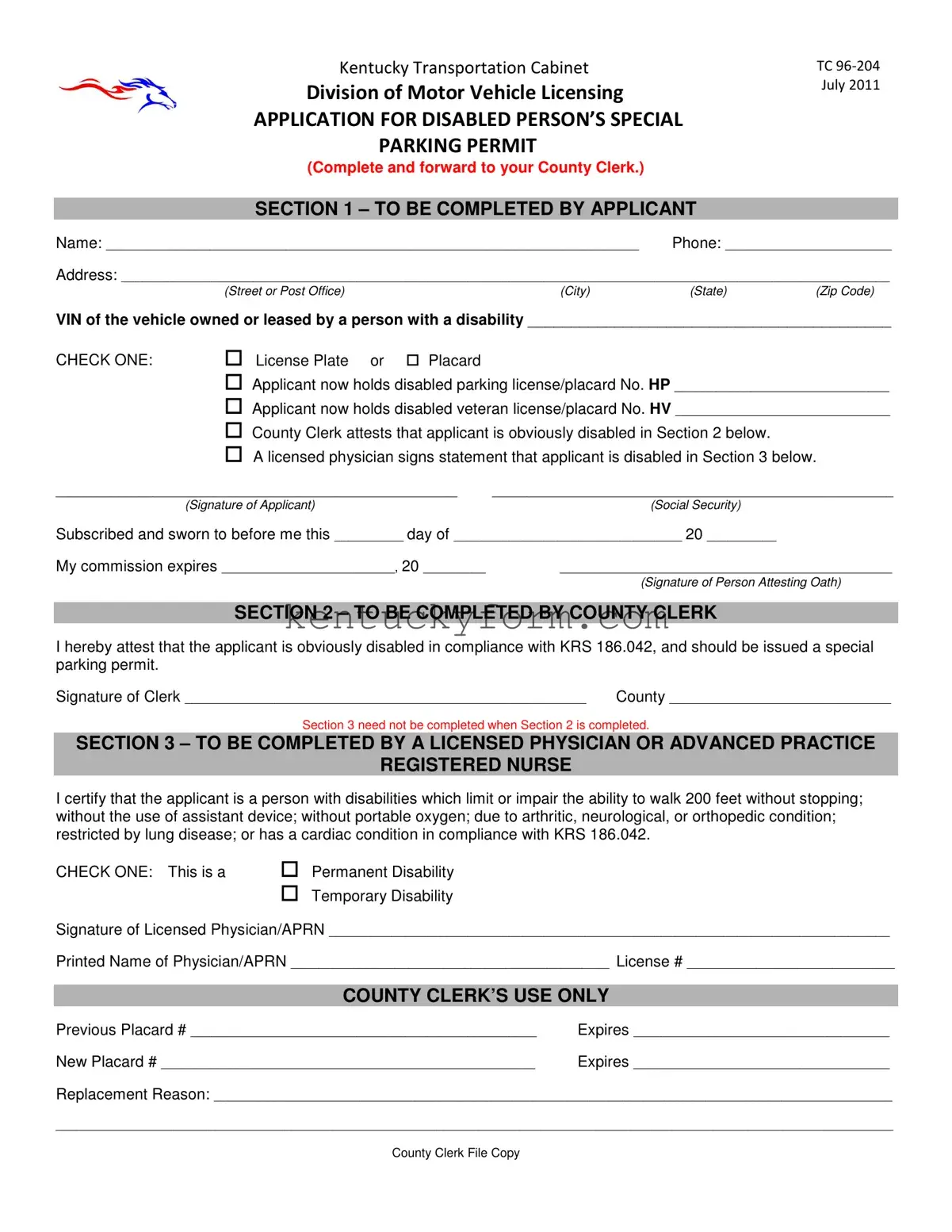The Kentucky TC 96-204 form serves a specific purpose for individuals with disabilities, enabling them to apply for special parking permits. This application mirrors several other forms and processes across different sectors in terms of its structure and intent. One such document is the Application for Disability Insurance Benefits, overseen by the Social Security Administration. Both applications aim to provide necessary support to people with disabilities, though they serve different functions—one offers financial assistance while the other facilitates mobility and accessibility.
Similarly, the Disabled Status Application for a Reduced-Fare Program, often found in public transportation systems, shares commonalities with the Kentucky TC 96-204 form. Both applications require certification of disability, either from a medical professional or through evident disability determined by an authorized official. These documents ensure that the benefits—whether it’s reduced transit fares or special parking permits—are rightfully allocated to individuals who face mobility challenges.
Vehicle Registration forms for Adapted Vehicles also parallel the TC 96-204 form in several ways. These registrations often require detailed information about the vehicle owner, similar to the Kentucky form, which includes the applicant's name, address, and contact information. Additionally, both types of forms might necessitate a declaration of disability to ensure the vehicle modifications or privileges are indeed necessary for the individual's mobility needs.
The Application for a Permanent or Temporary Handicap Placard in other states functions similarly to the Kentucky TC 96-204, providing parking privileges to individuals with disabilities. Though the application process and form specifics may vary by state, the underlying purpose—to certify disability for special parking permits—remains consistent. These applications often require medical certification or evident disability verification, echoing the Kentucky form’s requirement for a physician’s certification or county clerk’s attestation.
The Veterans Disabled Parking Placard Application is another comparable document. It specifically caters to veterans with disabilities, offering them special parking privileges. Like the Kentucky TC 96-204 form, this application typically requires evidence of disability, often substantiated by a physician’s certification or by proving one's status as a disabled veteran through official military documentation.
Applications for Disabled Person’s License Plates bear a resemblance to the Kentucky TC 96-204 form, as both cater to similar needs but through slightly different mechanisms. While the Kentucky form offers the option for a license plate or a placard, applications for disabled person's license plates solely focus on the acquisition of a vehicle plate. Both, however, necessitate a form of disability authentication to ensure the applicants qualify for the benefits provided.
Renewal Forms for Disabled Person’s Special Parking Permit share a procedural and purposive similarity with the initial application represented by the Kentucky TC 96-204 form. Though the Kentucky form can serve for both first-time applicants and renewals, dedicated renewal forms often require less medical certification, assuming the disability was previously verified. Nonetheless, they maintain the goal of ensuring continued accessibility and convenience for individuals with disabilities.
Lastly, the Temporary Disability Placard Application in various jurisdictions parallels the Kentucky form in accommodating temporary disabilities. These applications emphasize the short-term nature of the disability and often have a quicker expiry date than permanent disability forms. Like the Kentucky TC 96-204, they include sections for medical certification to validate the temporary disability claim.
Each of these documents, while tailored to specific needs or jurisdictions, shares the core objective of the Kentucky TC 96-204 form: to authenticate disability and provide necessary accommodations or benefits. Whether it’s for financial assistance, transit fare reduction, parking privileges, or vehicle registration for adapted vehicles, the process centers on certifying disability in a manner that is respectful, accessible, and supportive of individuals' mobility and daily living needs.


